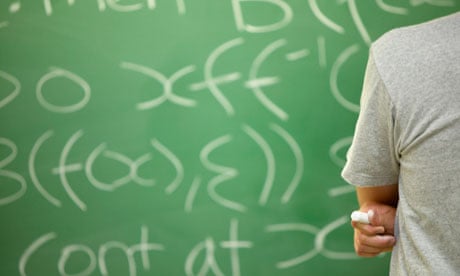England's brightest pupils are two years behind the best in countries such as Hong Kong and Taiwan by the time they take their maths GCSE, research shows.
It reveals England's cleverest pupils can match their peers in leading east Asian countries at the age of 10 but then fall behind.
Researchers suggested more needed to be done to ensure the most able pupils are able to keep pace with the highest achievers in other countries.
The study, by researchers at the Institute of Education, University of London, looked at the children's maths achievement in two international studies, the Programme for International Student Assessment (Pisa) and the Trends in Mathematics and Science Study (Timss).
Ministers have raised concerns about England slipping down international rankings and coming 28th in maths in the Pisa 2009 tests.
The researchers analysed Timss maths tests taken by nine- and 10-year-olds in 2003 and by 13- and 14-year-olds in 2007, and Pisa maths tests taken by 15- and 16-year-olds in 2009. The study concludes the gap between the top 10% of pupils in England, and the highest achievers in east Asia widens between 10 and 16.
Study author Dr John Jerrim said: "At age 10 the highest achievers in England can roughly match the highest achievers in Taiwan and Hong Kong, but by age 16, the highest achievers in England are roughly two years behind the highest achievers in those countries."
The research also found England's most able youngsters make less progress generally than those of similar abilities across the 12 other countries studied. The other countries studied were Singapore, Hong Kong, Taiwan, Japan, Australia, Slovenia, Norway, Scotland, the US, Italy, Lithuania and Russia.
The researchers concluded that England should focus on helping all youngsters with their maths skills at an early age.
Overall the findings showed that the nation's pupils are already some distance behind those in east Asia in their maths achievement by age 10, but this gap does not widen between the ages of 10 and 16.
"Our results suggest that, although average maths test scores are higher in east Asian countries than in England, differences do not seem to increase between the end of primary and the end of secondary school," the report says. "However, the gap between the highest-achieving schoolchildren in east Asia and the highest-achieving schoolchildren in England does seem to widen between ages 10 and 16."
English policymakers should concentrate on reforming maths in the early primary, and pre-school years, the report says, as well as ensuring the brightest youngsters are stretched in secondary school.
It says that the gap between the brightest pupils is an important issue. "Having a pool of very highly skilled individuals is vital for technological innovation and long-run economic growth," the report says.
The researchers say "cultural and social factors" may be behind the strong scores in east Asian countries. "In east Asian cultures education has historically been highly valued. This can be seen not only in teachers' high salaries, but also in the heavy investment of families in private tutoring services," they say.
The education minister Elizabeth Truss said reforms under way such as measures designed to bring in tougher discipline, more rigorous exams, more freedom for headteachers, a more demanding curriculum and higher-quality teaching would drive up standards.
The shadow schools minister, Kevin Brennan, called for more support in basic skills at primary level at a time when the government had cut support for catch-up tuition in English and maths. "We also need to strengthen English and maths teaching at secondary level," he said, "allowing all students to carry on doing these subjects until 18. However the government only wants to get pupils to resit their GCSEs if they don't get a C."
